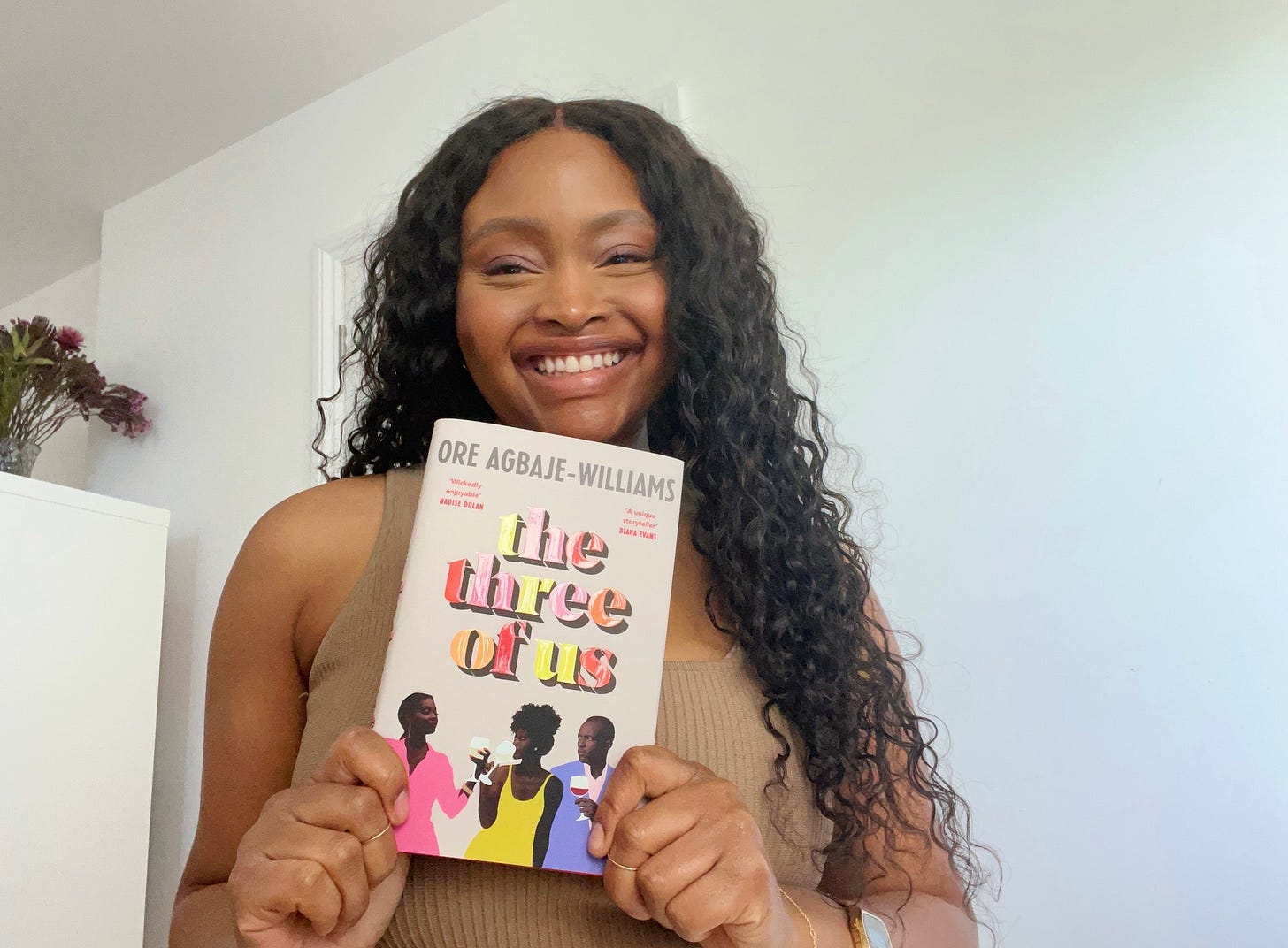The Companion 005: When your best friend won’t let you go
Author Ore Agbaje-Williams examines the reality of a friendship straining at its seams.

This week on The Companion we’re joined by our first guest, the amazing author (and my friend) Ore Agbaje-Williams. I recently finished reading her debut novel The Three of Us and it is an utterly compelling, spicy, short read that tackles a side of friendship that I’ve rarely encountered. Below, she divulges more.
If I’ve learned anything about friendship in my 29 years of life, it’s that they are never just one thing. I’ve had friendships that have grown into something more meaningful, some that have regressed and some that have ended.
Friendships are complex and that’s something I wanted to reflect on in my debut novel The Three of Us, which explores the dynamic between a wife, her husband and her best friend. The husband and best friend despise each other.
I’ve loved seeing books, films and TV shows, (such as The Neapolitan Quartet by Elena Ferrante, Mike White’s The White Lotus and Zoë Heller’s Notes on a Scandal), about toxic friendships. I wanted to look at the messiness of them, at what happens when you’re going in different directions but are still trying to hold the old version of your friendship together.
Romantic relationships ending is normal to us, but friendships ending feel like a specific kind of failure; like you’ve failed at something that should be easy. I wanted to see what happens when someone decides categorically not to fail, when not giving up becomes desperation.
“What happens when you’re going in different directions but are still trying to hold the old version of your friendship together?”
In my novel, Temi is independent, anti-almost everything that isn’t pure enjoyment and selfishness (“By Myself, For Myself … My own decisions, made purely for myself, with consideration only for the environment and the NHS,” she declares). She’s fiercely loyal and protective.
Her best friend is a little less outspoken and sure of herself. She’s neatly tucked into her marital role (“In my husband I found someone for whom the bare minimum was more than enough, someone who didn’t expect anything of me that I wasn’t willing to give,” she reflects).
Although her husband’s mere existence is a point of contention between them, given that the two friends had once vowed to stay single in their interests of independence, I didn’t want it to be a story of two women fighting over a man, nor about what a man has done to their friendship. Rather, I wanted to explore how the best friend and the wife navigate their differences and their contrasting approaches to adult life.
Temi wants them to stay true to their selfishness and live only for themselves, subvert all patriarchal expectations and live their lives on their own terms. The wife wants the best of both worlds: the security and peace that domesticity brings and the fun of hearing Temi’s stories, without having to be like Temi; something she tried before and never quite felt comfortable doing.
Approaches like those of my protagonists are often guided by our motivations – what we bring to a friendship and what we get from it. We can find ourselves dissatisfied with our friends when what we get from a friendship doesn’t feel like it matches up to what we believe we bring.
“We can find ourselves dissatisfied with our friends when what we get from a friendship doesn’t feel like it matches up to what we believe we bring”
In The Three of Us, I really enjoyed picking that apart. For Temi, her mantra of “By Myself for Myself” doesn’t work without someone else to share it with. Her motivations for that life are somewhat selfish and have more to do with maintaining her own happiness than doing what’s best for her friend and supporting her. For the wife, her life of domesticity isn’t as enjoyable without someone there to remind her of the excitement of the life she used to live, even if she has no intention of returning to it. Her need for Temi is about maintaining her own balance.
Their dynamic, though unhealthy, defines a lot of relationships we have. A tug of war in which we will do anything to protect our lifestyles. Where we keep people around because it benefits us, rather than asking ourselves what we bring to them.
So what happens when that tug of war comes to a head over the course of one day and involves a lot of wine? Chaos.
Ore Agbaje-Williams: “A friendship ending doesn’t have to be catastrophic”
What’s the best thing you’ve read, listened to or watched on friendship recently?
Ore: Trust by Hernan Diaz. Anyone who’s read it might say that it’s not a book about friendship, and that’s probably right, but among other things, it’s a book about a lack of friendship and what that can do to two people who isolate themselves, and the ways that they try to compensate for that.
Who is a friend you appreciate at this moment and why?
Ore: My cousin Juwon – we’ve become so much closer over the last few years, not just because we’re related, but because we know each other so well and can talk about all kinds of rubbish all day. He’s thoughtful and kind and hilarious and every one of my friends who knows him also loves him because he’s just always great vibes and generally a wonderful person to be around.
And finally, how do you think the culture of friendship is changing in this moment?
Ore: I think we’re becoming a lot more aware of the natural ebbs and flows of friendship, and the idea of them ending and not being catastrophic. We’re understanding that not all friendships last forever and they can be for a reason and a season in a healthy way. We used to see the end of a friendship as either the culmination of some huge argument or a failure to be something to someone else, match their expectations, when really these things happen all the time. So I believe we’re gaining a healthier approach than we used to!
The Three of Us is available online and in all good bookstores now. Follow Ore Agbaje-Williams on Instagram.







I've had friendships persist, and friendships end. I've even had friendships spend a long time dormant - in a sort of pupal stage - before emerging as something totally new.
David Whyte wrote something beautiful about friendship some years ago, and I think you might enjoy it:
“The ultimate touchstone of friendship is not improvement - neither of the other nor of the self. The ultimate touchstone is witness. The privilege of having been seen by someone and the equal privilege of being granted the sight of the essence of another. To have walked with them and to have believed in them, and sometimes just to have accompanied them for however brief a span, on a journey impossible to accomplish alone.”
- David Whyte